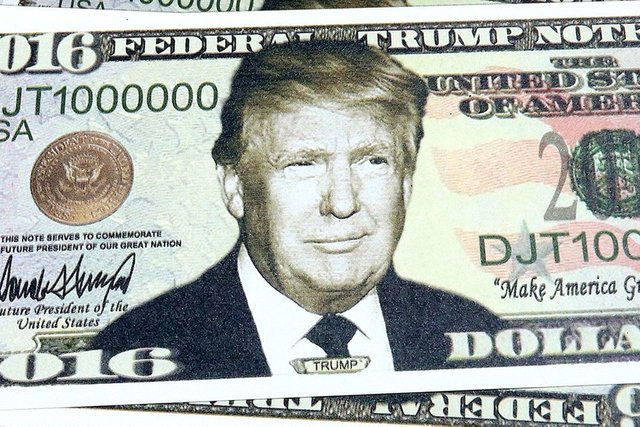
The debate has resurfaced several times during the history of Bitshares. Before the 2.0 version, it was even the case that holding Smartcoins was, indeed, rewarded with yield ("interest").
At the time, under the leadership of @dantheman (bytemaster), smartcoins yield was deemed unsustainable, amidst fractured opinions within the community.
In one form or another, we are still undecided about the subject - the introduction of the Steem-backed dollar, which resulted in yet more voices making themselves heard, in favor of introducting yield for Smartcoins in Bitshares, is but the latest example of this.
TANSTAAFL
Now, as a "Bitshares bank customer" myself, I would naturally prefer if it were the case that my neatly-but-all-too-public-can-we-have-stealth-this-summer-please parked bitUSD multiplied like rabbits come springtime.

It does seem like a good idea on the surface. Free money, who does not like it?
But is it justified?
Food for Thought

Picture a dollar bill.
Is it money? Yes.
Does it generate yield? No.
You get yield only after you deposit said dollar bill at the bank - and at that point, it is not money anymore, it is a bank deposit: essentially, an unsecured liability.
For taking on the risk of depositing the money at the bank, you are eventually rewarded for it - yield/interest.
Now, deposits in bitshares suffer from a curious, and crucial difference from bank deposits.
At the bank, once you make a deposit, the institution is free (and you can bet they will) to take your money and lend or invest it elsewhere.
For the risk involved, it bears repeating, you are rewarded with some yield for the privilege of allowing the bank to speculate with your money.

Meanwhile, with Bitshares, the situation is slightly different.
You make a deposit (convert an altcoin, bitcoin, fiat, etc), and ...
It just sits there.
Are you exposed to some risk? No doubt - the network could go down, or a black swan event resulting in a large portion of your Smartcoin holdings being liquidated could occur, to give but two examples.
On the other hand, one could easily argue that holding paper money itself also has risk -- and thus should also be eligible for yield.
It can be stolen, physically destroyed (on accident), inflated away, replaced by a new fiat currency, and so on.
Let us take gold as an example. Gold is money (in spite of much effort to hide this fact), and it produces no yield; because it has no risk (in the sense that it is not a risk asset) - 100 ounces of gold today will still be 100 ounces of gold, 100 years from now.
Or take Bitcoin: again, no yield. Perhaps it is no coincidence that it has been hailed as digital gold for some years.
To make the point clearer, when it comes to defining risk in this context, no one in their right mind would say that holding bitcoin carries no risk -- but this is risk used in a very different way.

What I mean here when I say that holding bitcoin has no risk is that if you hold bitcoin (and not an ETF/IOU), you hold the primary asset itself -- and thus risk in this sense does not exist - like holding the dollar bill from the previous example.
For that reason, it should not return any yield: money can be a medium of exchange, a store of value, and a unit of account, but true money is not a risk asset. (James Rickards)
To yield or not to yield?

The tricky part is whether we should consider the Smartcoins - bitUSD, bitEUR, bitCNY and so on, a primary asset in the narrow sense alluded to above.
My present understanding is that we should -- and thus, holding smartcoins should not return any yield.
Yes, there are some risks involved, but of the same class as the dollar bill burning to a crisp, or a critical flaw in the bitcoin network being encountered - in that sense, there is always risk.
When we say gold has no risk and thus should not return any yield, of course certain classes of risk like nuclear attacks are outside the scope of what is understood as risk in this context -- context is everything.
Conclusions
If you want to receive yield from your dollar bills, you put them in the bank/broker, or somehow invest them.
If you want to receive yield from your bitcoins, you make them available for lending, investment, and so on, with a third party (which involves risk).
It seems to me that if you want yield from your Smartcoins, they ought to be invested with a third-party company willing to invest your money and share the profits with you.
No yield for Smartcoins then, is a feature, not a bug.
I'm 100% behind the reintroduction of smartcoin yield (and preferably also UIA yield/interest). I felt that the "5% on anything" was an incredibly powerful message and was a major selling point for me when I invested in BTSX. I believe the removal of '5% on anything' has partially caused the long downtrend for BTS.
Thanks @karnal, I've posted in the Bitsharestalk thread too.
Edit: Just promoted your post $1.00 (enough to get it promoted on the individual 'subs').
Downvoting a post can decrease pending rewards and make it less visible. Common reasons:
Submit
I have upvoted but I disagree...I think that holding bitassets in bitshares DEX is like holding your money within a bank and bitasset holders should earn interest. I have proposed and defended my view on the below in the past how bitasset holders could earn the yield from very small amounts from the reserve pool. I still believe that we should try the experiment proposed for a couple of months to see what happens, but apparently no one want to step forward and do some change...
https://steemit.com/bitshares/@mf-tzo/proposal-to-reward-bitassets-holders-with-interest
Downvoting a post can decrease pending rewards and make it less visible. Common reasons:
Submit
I don't think we should be introducing interest on exchange backed assets (open.xyz), because that would place an exchange in the position of either staking with user's funds to provide this interest or would potentially put OpenLedger in a somewhat insolvent scenario.
I like the idea mainly for UIA - allowing an issuer to set scheduled interest payments to holders, by increasing the coin supply & distributing the new funds to holders.
Reintroducing yield for smartcoins would probably work best as 50:50 witness/holders receiving yield from MPA trading fees.
Downvoting a post can decrease pending rewards and make it less visible. Common reasons:
Submit
I don't get what you say.. In my proposal, on daily basis the pool reserve fund sell an extremely small portion of bts for Open.xxx assets and rewards the bitasset holders with this interest. The bitasset holders can freely decide to either hold the open.xxx asset or sell it for bts,bitasset or whatever...
In any case, if you guys for some reason you believe open.xxx asset for interest is not a good option, just use the reserve pool and do that calculation rewarding bts to bitasset holders who then can again freely choose what to do.
with less than 20,000 bts daily from the reserve pool we can reward 10% interest in the form of bts to the current bitasset holders. The yield will be adjuseted accordingly depending on bitasset supply and bts price...But for the love of god..We can achieve so much with just 20,000 bts daily from the reserve pool and nobody is implementing a worker proposal for that..I just don't get it why..
Downvoting a post can decrease pending rewards and make it less visible. Common reasons:
Submit
Totally agree. All that ideas for giving money to the traders makes me sick. Every exchange should earn on traders, otherwise is a buissnes that must fall.
Want profit? Take your risk.
Downvoting a post can decrease pending rewards and make it less visible. Common reasons:
Submit